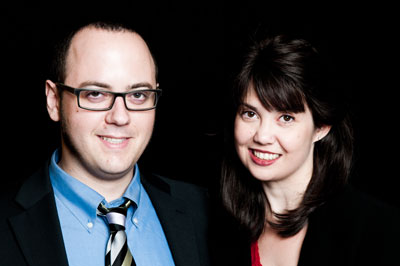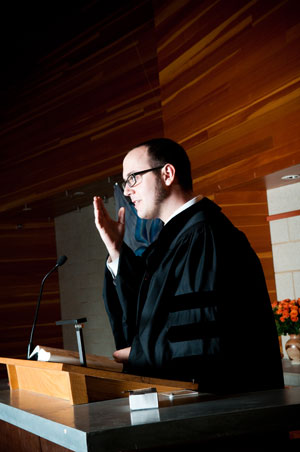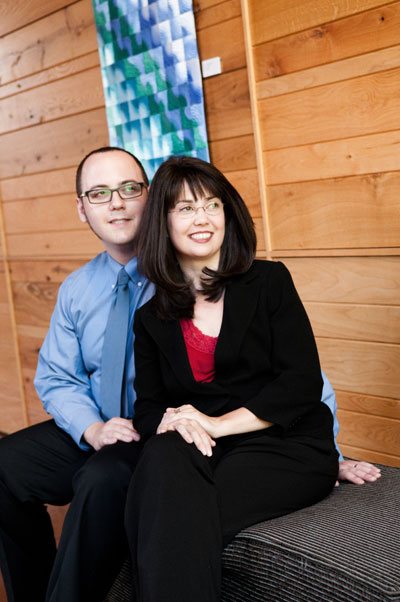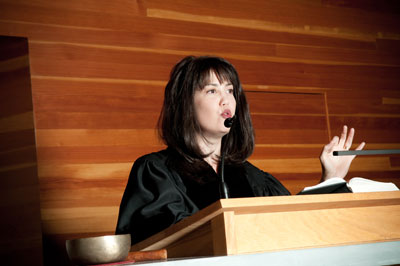Our Leadership
Co-Ministry

As co-ministers, we bring two minds and complementary strengths and passions to our team leadership. We will collaborate very closely to oversee the life of the church as a unified team. We are committed to being fully equal as ministers. We are both 100% committed and accountable to the congregation we will serve. Under a unified vision, we will divide the portfolio of church life to best utilize our respective strengths, outlining clear roles, responsibilities, and ownership of different program areas. While we will divide ministerial responsibilities into two portfolios, we will occupy an equal place in terms of ultimate responsibility and accountability.
We are mindful of traditional expectations of male and female roles in ministry. We will exercise care and deliberate attention to the dynamics and appearance of equality. Despite our society's progress in gender equality, all too often female ministers are still viewed as associates. Women are often presumed to specialize in historically feminine aspects of ministry, such as education of young children and pastoral care, while administration, finance, and homiletics are the realm of men. We have experienced this dynamic, and are committed to not only serving as equals, but serving the church according to our own, unique gifts, which at times subvert gender stereotypes.
We are committed to getting the work done, but also to being effective colleagues. We expect to spend time regularly talking about what's working well and finding our areas of opportunity as a team—just as we will with the larger staff team. We have found it useful to meet regularly with one another and our colleagues to reflect upon how our work together is going, to focus on our process, roles, and relationship—allowing us to air any grievances and to celebrate our successes. When we are in right relationship, we are of most service. Articulating how we hope to be with one another is the foundation for the work we hope to do with one another.
All ministries have a beginning—and an end. To lay a solid foundation at the beginning of our ministry, we will covenant together as co-ministers and with our staff team to articulate our hopes, commitments, and the nature our relationships. To preserve the unity and health of the congregation we serve, we will contract that when the time comes that one of our ministries must conclude, we will depart as a team. The health and well-being of the congregation are our ultimate concern throughout the entirety of our ministry.
Any form of team ministry requires collegiality, commitment, clear communication, and support. This support can come in many forms: the committee on ministry, coaching, counseling, and professional development. As co-ministers who are a married couple, we are aware of the multiple layers of our relationship. The health of our ministry is contingent upon the health of our relationship; we will tend to it with care. We will actively seek out support on a regular basis to help us deliberately process issues that will inevitably arise from our work together. We have the added support of our colleagues in our UU Clergy Couples group. We will continue to develop our network of individual and team support. We hope to lead by example by regularly nourishing both our professional and personal relationships with intentionality.
Governance
We will work closely with the board of trustees to develop a clear differentiation between governance and management responsibilities. This is the foundation that will allow us to live the mission of the church in concrete, measurable ways. We can work most effectively together when we clearly define roles and responsibilities of church members, staff, lay leaders, and stakeholders. We will work closely with the board to define the results to be achieved by the church (ends), to develop interpretations of those church "ends" as defined by the board, and we will be fully accountable for ministerial direction and decisions.
Within any governance model, we are committed to this type of clarity and accountability. Ministry unfolds in a set of overlapping teams: our primary team as co-ministers, with program staff, with support staff, with lay leaders, the congregation as a whole, and the surrounding community. In all of these teams, we will function as collaborators while maintaining our role as co-ministers—working together towards a common shared vision while maintaining bonds of trust and care. Ministry teams can serve our congregations in remarkable ways. Together as co-ministers we can offer a congregation far more than either of us could alone.
Leading Change

As a team, we bring rich training in leadership and change management from seminary, a CPE residency, continuing education, and the corporate world. We are adept learners and effective team builders. Much of David's work at Target Corporation over the last six years has been focused on leading change efforts, principally around employees' collaboration. When Dave was first hired, the corporate culture was one of silos: individuals teams shared only what information had to be disclosed, and kept the rest closed off. Dave led implementation of a corporate Wiki encyclopedia, overhauled the company's document management and collaboration system, and implemented a micro-blogging platform (like an internal Twitter) to open a more effective communication channel across different parts of the company.
Growing the Target Wiki was not an "official" project: it was not funded, it was not part of Dave's core role initially, nor was it a formal assignment. But his passion for it was borne out of critical pedagogy: he fervently believes that training and information is not the province of an elite few who dispense it to the many. Instead, Dave believes everyone has something to contribute, everyone is an expert at something, everyone knows something worth sharing. Dave sought to empower team members around the world to share what they know. A Wiki encyclopedia where anyone could contribute was the vehicle to make that vision real. Dave met substantial resistance: legal and employee relations teams, communications and training teams, technology and infrastructure support teams were not on board at the start of the process.
Dave employed his expertise as a leader to drive change. He started by defining and articulating the vision and then building coalitions and commitments around that vision. No change gets done alone, and vision is key to bringing in partners and allies. Vision is an idea, a story, a sense of what it will look and sound and feel like when the change has happened. Partly, this comes down to building a compelling story to explain not just why change is needed, but why change is needed now. Leading change meant being attentive to training, knowledge management, communication, leadership, and systems and processes.
The primary audience for Dave's work was a group of about 20,000 employees, 3,000 of whom were based in India, China, and other global locations. Attunement to the cultural norms and expectations of those countries was critical: what communication channels they expected to be contacted through; what level of involvement was needed from their leadership; what degree of guidance was required (or not) to use the tools—in all of that, what made the effort successful was to approach it from a stance of continuous learning and curiosity. The agenda Dave wanted to share was a vision for collaboration, but the way that vision became real looked different in different cultural contexts. Dave's work was to ask a lot of questions, to partner with leaders who could speak to their cultural contexts, to speak with peers who had similar experiences, to talk directly with team members affected by the change.
Dave—and Target—found great success. With partners onboard, Dave grew the internal corporate Wikipedia from a few dozen users to more than 40,000 users. He grew the internal corporate Twitter service from a few hundred users to 15,000 users. Dave used his change management leadership to put his critical pedagogy vision into action using social media tools. He empowered individual team members to make a difference by sharing what they know, to have a broader reach than their immediate team. Dave champions the idea that everyone is an expert at something. As a leader, he seeks to unlock that expertise rather than to be a gatekeeper.
Dave's work at Target Corporation has contributed to his understanding of what great leadership looks like. He has worked first-hand with excellent leaders and knows how to build great teams, develop people, set up systems and processes, and keep teams motivated and engaged. He brings strength in ideation, creativity, explanation, business expertise, systems thinking, and training and development. Dave bring this experience to the church with a strong focus on developing members of the church who are deeply invested in the mission, vision, and values of the organization.
Lay Leadership

The word liturgy, often used to describe worship, means "the work of the people." We believe that all of church life—from worship to governance—is ultimately the work of the people. We understand lay leadership as ministry in its own right. At its best, leadership in the congregation can be an avenue for spiritual growth rather than an administrative chore. Great lay leaders know who they are and who they are called to be. To this end, we seek to ground lay leadership in theology, provide inspiration, and regular opportunities for spiritual deepening and critical reflection to nourish and grow congregational leaders.
In many churches, leadership positions can be hastily filled. We believe it's important to exercise intentionality in the match between a member's gifts and the needs of the church. This is not ad hoc work, but is intentional: collaborating with staff, with the board, with the nomination committee, and church members. Together, we seek to look several years into the future to build a "pipeline" of leadership development and succession. By doing so, we can cultivate leaders in stages over time. This ensures continual leadership viability and promotes the health of the congregation through shared leadership.
We believe it's critical to provide lay leaders with the means to succeed in their work. This includes both concrete resources for the task at hand, as well as investment in our leaders' skills and knowledge. Moreover, we want to cultivate lay leaders by nurturing their sense of the mission, vision and values of the congregation: where we have come from and who we hope to become.
We seek to empower lay teams, getting people involved while bringing to bear the unique skills and experience that we offer as ministers. For example, when Dave launched the annual Passover Seder at White Bear UU Church, he recruited a small team, inspired a vision, provided a model to carry it out, and then gracefully stepped out of the way to let that team own the project. Then, equipped with the tools they needed, the team as a whole took ownership of this elegant yet informal, participatory event and have carried it forward ever since. We seek to build such intentional teams of people who share a common vision and an ethos of working together to make that vision real—and who know why the work they do matters.
In all of our work we will relate to lay leaders firstly as their ministers. Rather than viewing lay leaders as extensions of staff, we seek to attend to them as congregants with all the hopes, fears, joys and anxieties of life. We will to tend to them in worship, in ritual, in conversation, and in our work together. It is our hope to collaborate with lay leadership to work towards a implementing the mission of the church. Yet, all the while, we hope to attend to each member with care. Ultimately, the church is its people, not its minister. We want to know the people's vision and how we can serve it, for the people of the church precede our ministry and will continue long after.
Church Staff

In our experience, successful staff teams share some characteristics: a sense of community, fit between talent and task, appropriate cross-training, and humor! A clear sense of collective mission, clearly defined individual roles, and accountability are keys to success. As co-ministers, it is our job to create an environment in which church staff will find their work to be fulfilling and appropriately challenging—ultimately a job in which their skills meet some of the worlds' deep needs. We want to cultivate a workplace where we all like to come to work in the morning. This is when we can be the most creative, productive, and the happiest.
Though the specifics would vary based on governance model, we are committed to building and developing the very best team possible. That requires defining clear roles and responsibilities, coaching and developing staff, removing obstacles to success, and ensuring staff have the resources needed to do their jobs. We believe clear expectations and communication are the basis of shared success. To this end, supervisors and direct reports fare best when they can meet regularly, and when there is a clear system of review.
To build the best team possible, we are committed to making sure good systems are in place for defining responsibilities, setting goals, assessing performance, and giving feedback. We will ensure that there are well-established practices are in place for right relations, right conduct, HR policy, and pay and benefits. We hold high expectations of staff, as we do for ourselves. A church is best served by attending to staffing concerns respectfully, fairly, directly—and in a timely manner.
We deeply respect and value the expertise on a staff team; staff will find us to be their greatest cheerleaders. The congregation needs the expertise of a well-rounded and balanced staff team contributing their expertise and gifts. Together, we can create a fun, engaging, low-drama, spiritually grounded place to work—living the mission of the church.
Stewardship

The Rev. Henry Bellows was a leading force organizing Unitarian churches into a larger association in the nineteenth century. He said that institutions are "the only instruments except literature and the blood, by which the riches of the ages, the experience and wisdom of humanity are handed down." We are institutionalists; we believe our religious heritage and our voice for justice is best perpetuated by our congregations. Financial health is a vital part of maintaining and growing our congregations.
Stewardship is more than fundraising; it is also tending to the total church, taking seriously the future for which we are responsible. Good stewardship ensures that the financial commitments of the church are constant with its mission and values. Of course, stewardship is also about short-term and long-term financial viability and fundraising. Yet, at its core, stewardship is a spiritual issue. The financial aspects of congregational life can serve as an invitation to examine our values. We hope to provide programming and tools for the congregation to explore how we individually and collectively spend money, how that aligns with our values, and to ground this work in our theology. We believe cultivating a vibrant community of generosity is the basis of our larger work.
We are comfortable talking about money. Teri participated in Unity Church, Unitarian's year-round canvass committee, has asked for significant donations, and brings a deep interest in money and spirituality. Dave was a telephone fundraiser for Harvard Divinity School throughout his studies, he led the canvass committee as a lay person at the UU Church of Medford, and he contributed to the design and implementation of the pledge drive during both years of his internship. Additionally, while at White Bear UU Church, Dave collaborated with the social action committee to encourage the board to give away the plate. He benchmarked with other congregations, and then worked with the senior minister and committee members to help the congregation increase their generosity. As a result, the church now gives away the plate two Sundays a month.
We seek to be involved in the stewardship of a congregation to ensure its financial viability in both the short and long-term. This includes involvement in significant budgetary discussions, the annual canvass, and any capital campaigns. We will build relationships with major donors first and foremost as their ministers, but also to foster their generosity for good of the church and the broader community.
Pledging information speaks volumes about the financial ethos of the congregation. More importantly, pledging changes are often the first indicator of hardship in a congregants' life—health issues, job loss, home loss, or a broken relationship with the church. These issues are of deep pastoral import. How a congregation talks about these issues—or more often, doesn't talk about them—conveys much about its culture.
We will advocate for generous giving; we will lead by example. We are committed to pledging generously—and openly—to the congregation. We seek to engage the congregation on the topic of money in the larger context of our religious values and the mission of the church, promoting a culture of transparency. Clearly, the details of budgetary health are best suited to financial and accounting experts. Yet, ministerial leadership in money matters is vitally important. We would seek to ground fundraising in our religious values, to lead by example, and to ask people to give generously to a cause to which we have devoted our lives.
All site content and design by David and Teri Schwartz
